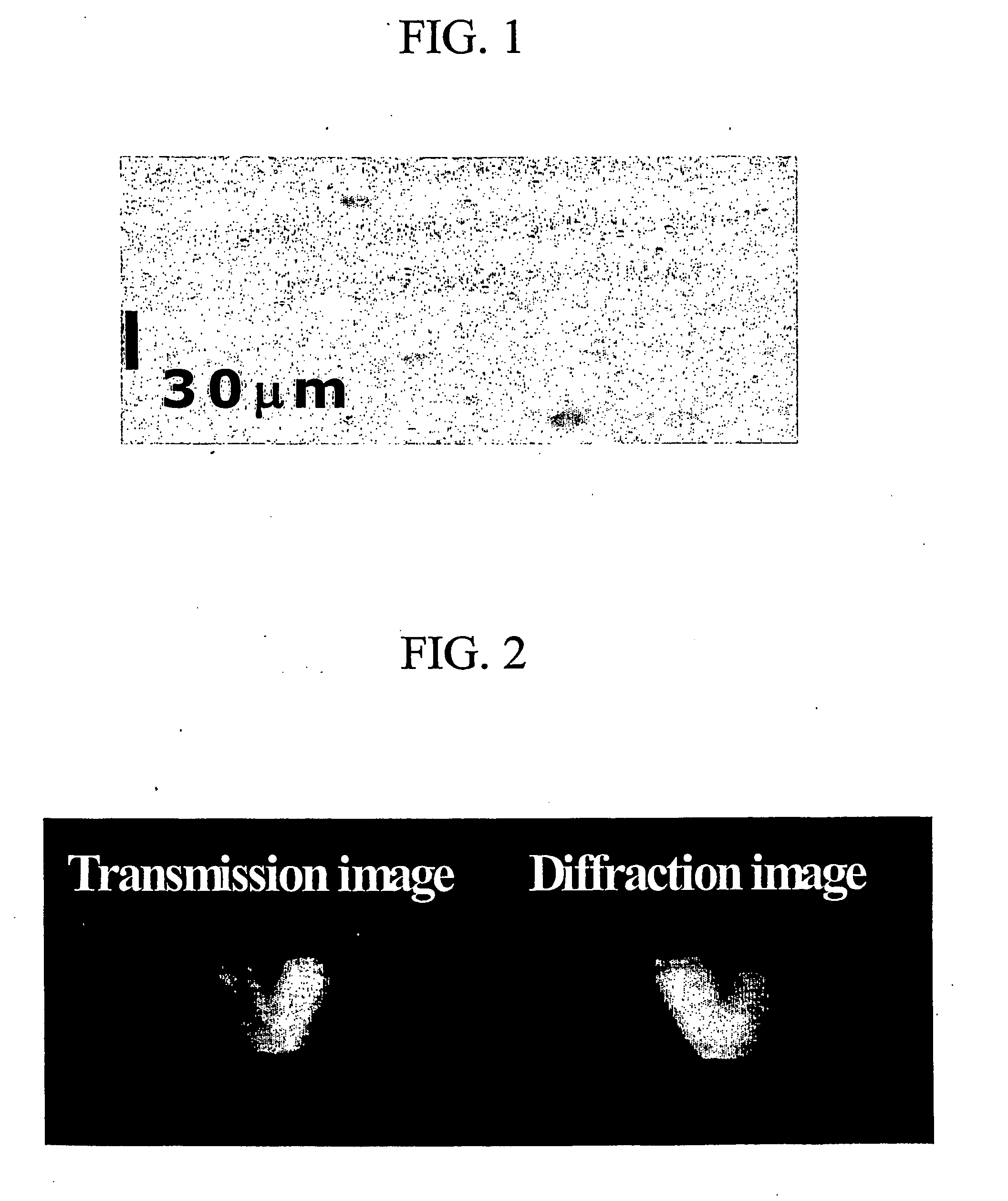Photopolymerizable composition and photopolymerizable film prepared therefrom
- Summary
- Abstract
- Description
- Claims
- Application Information
AI Technical Summary
Benefits of technology
Problems solved by technology
Method used
Image
Examples
preparation example 1
[0029] 15 g of 3-glycidoxypropyltrimethoxysilane(GPTMS), 12.78 g of tetraethoxysilane(TEOS), 8.36 g of methyltrimethoxysilane(MTMS) and 9.17 g of the compound of formula (II-a) were dissolved in 20 ml of 2-methoxyethanol and 20 ml of isopropylalcohol. 5 ml of 0.5N hydrochloric acid was slowly added to the mixed solution at 70° C. and stirred for 24 hrs under a nitrogen atmosphere. The reaction mixture was subjected to vacuum evaporation to obtain 33.53 g of a transparent organic-inorganic hybrid-type sol-gel solution. 0.168 g of tetraethylammonium perchlorate and 0.0168 g of Byk301 were added thereto with vigorously stirring, and filtered through a 0.45 μm filter, to obtain a transparent sol-gel solution.
preparation example 2
[0030] 15 g of GPTMS, 12.78 g of tetramethoxysilane(TMOS), 8.36 g of phenyltrimethoxysilane and 12 g of the compound of formula (II-b) were dissolved in 20 ml of 2-methoxyethanol and 20 ml of isopropylalcohol. 6 ml of 0.5N hydrochloric acid was slowly added to the mixed solution at 70° C. and stirred for 10 hrs under a nitrogen atmosphere. The reaction mixture was subjected to vacuum evaporation to obtain 35 g of a transparent organic-inorganic hybrid-type sol-gel solution. 0.2 g of tetramethylammonium perchlorate was added thereto with vigorously stirring, and filtered through a 0.45 μm filter, to obtain a transparent sol-gel solution.
preparation examples 3 to 5
[0031] The procedure of Preparation Example 1 was repeated using the reactants and siloxane precursors shown in Table 1, to obtain transparent sol-gel solutions.
TABLE 1PreparationSiloxaneWeight afterNo.precursor (g)Other reactants (g)evaporation3CompoundGPTMS (15), TEOS (12.7), MTMS (8.3),32 g(II-a) (10)2-methoxyethanol (20 mL), isopropylalcohol(20 mL), 0.5N hydrochloric acid (5 mL),tetraethylammonium perchlorate (0.168 g),Byk301 (0.0168 g)4CompoundGPTMS (15), TEOS (12.7), MTMS (8.3),35 g(II-c) (9.2)2-methoxyethanol (20 mL), ethanol (10), TNF(10), 0.5N hydrochloric acid (5 mL),tetraethylammonium perchlorate (0.11 g),Byk301 (0.0168 g), tetrabutylammonium (0.08 g)5CompoundGPTMS (15), TEOS (12.7), MTMS (8.3),37 g(II-d) (10)2-methoxyethanol (20 mL), isopropylalcohol(20 mL), 0.5N hydrochloric acid (5 mL),tetraethylammonium perchlorate (0.168 g),Byk301 (0.0168 g)
(CH3CH2O)3—Si—(CH2)3—NH—CO2—(CH2CH2O)7˜8—CH3 (II-a)
(CH3O)3—Si—(CH2)3—NH—CO2—(CH2CH2O)7˜8—CH3 (II-b)
(CH3CH2O)3—Si—(CH2)3—NHCO...
PUM
| Property | Measurement | Unit |
|---|---|---|
| Temperature | aaaaa | aaaaa |
| Fraction | aaaaa | aaaaa |
| Time | aaaaa | aaaaa |
Abstract
Description
Claims
Application Information
 Login to View More
Login to View More - R&D
- Intellectual Property
- Life Sciences
- Materials
- Tech Scout
- Unparalleled Data Quality
- Higher Quality Content
- 60% Fewer Hallucinations
Browse by: Latest US Patents, China's latest patents, Technical Efficacy Thesaurus, Application Domain, Technology Topic, Popular Technical Reports.
© 2025 PatSnap. All rights reserved.Legal|Privacy policy|Modern Slavery Act Transparency Statement|Sitemap|About US| Contact US: help@patsnap.com



